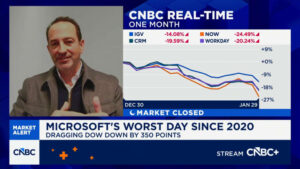U.S. stock exchanges will be closed on Good Friday, but that won’t stop the government from releasing the March jobs report.
So how will investors digest the figures?
Good Friday is a market holiday but it isn’t a federal holiday, so the U.S. Labor Department will release the employment data at its usual time of 8:30 a.m. Eastern. While U.S. stock exchanges are closed, CME stock-index futures will trade until 9:15 a.m. ET.
But that’s a venue dominated by institutional investors and professional traders.
“You have to be a pretty specific kind of a money manager to want to trade on that number on a macro basis” in the futures market, said Thomas Martin, senior portfolio manager at Atlanta-based Globalt Investments, in a phone interview. “I wouldn’t suggest to the average person that they would want to get involved in that.”
Monday is likely to offer a clearer sign of what investors make of the jobs data.
“If anything, it will avoid that immediate knee-jerk reaction” that often follows major data releases, said Randy Frederick, managing director for trading and derivatives at the Schwab Center for Financial Research. “It will allow three days for people to digest the data, look at all the components of it, and make rational decisions come Monday morning.”
There will be an abbreviated U.S. Treasury debt trading session on Good Friday, with Sifma recommending a noon close. Trading in both stock futures and bonds is expected to be thin, potentially adding to volatility.
Economists surveyed by The Wall Street Journal, on average, expect the data to show the U.S. economy added 238,000 jobs in March, down from 311,000 in February. The unemployment rate is expected to come in unchanged at 3.6%, while average hourly earnings are seen rising 0.3% after a 0.2% increase in February.
See: U.S. economy forecast to create 238,000 jobs in March. The Fed wouldn’t be happy.
On Tuesday Treasurys rallied, pulling down yields, while the S&P 500 index
SPX,
and Dow Jones Industrial Average
DJIA,
snapped four-day winning streaks. The moves came after March data showed the number of U.S. job openings dropped below 10 million to a 21-month low, indicating a hot jobs market may be starting to lose some sizzle.
Stocks were mostly lower on Wednesday after ADP said the private sector added 145,000 jobs in March, well below the 210,000 expected by economists.
Stocks may be prone to weakness over the remainder of the holiday-shortened week, but that shouldn’t necessarily be taken as a sign investors are bracing for bad news on Good Friday, said Sam Stovall, chief investment strategist at CFRA.
“Maybe we go back into the green on Wednesday, but then traders decide they don’t want to be overly exposed over a long weekend and they take some additional profits on Thursday ahead of the long weekend,” he said, in a phone interview. “I don’t hink it would mean they are anticipating negative news, they just don’t want to be blindsided.”
This post was originally published on Market Watch






